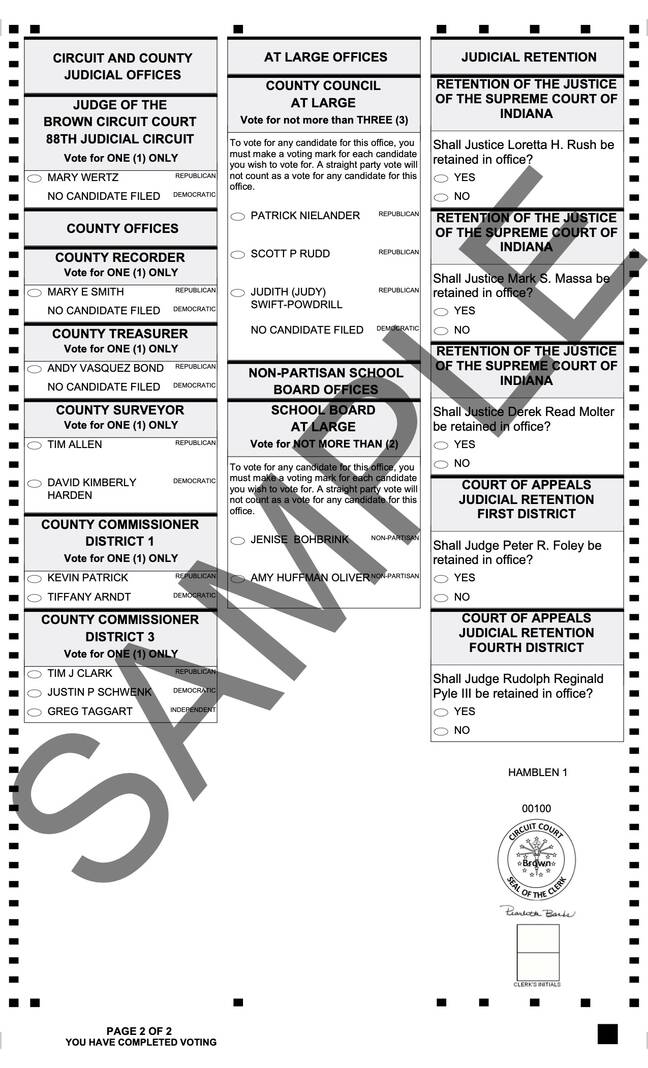On Election Day, if you vote in person, you’ll see some dedicated folks making sure elections are fair and secure. Poll workers receive training and written instructions. Besides training and advance set up, workers serve very long hours on Election Day. They arrive at 5 in the morning, take an oath of office, unlock security seals and set up equipment and supplies; post sample ballots, voter instructions and more.
Polls open at 6 a.m. Workers stay until well after polls close at 6 p.m. to securely close down, secure equipment and supplies. Designated bipartisan teams then take supplies back to the Election Board Central Count.
Every position but one is staffed by both a Democrat and a Republican. The job responsibilities may vary a little but typically include:
- Sheriffs. One Democrat and one Republican. The sheriff may remind you to get out your photo ID. Like the title implies, they enforce election rules such as asking voters to cover clothing or remove items that display support or opposition to a candidate or party. Violators will not be disenfranchised, but their name might go on a list for possible later complaint or action.
- Poll clerks. One Democrat and one Republican. Clerks look at your photo ID. When your qualification to vote is confirmed, you’ll be asked to sign the ePollbook. You receive a paper ballot, or will be guided to the Freedom Vote machine if audio or visual assistive devices are requested.
- Judges. One Democrat and one Republican. Judges help voters vote if needed, guide voters to insert completed ballots into the optical scanner to be tallied, and support inspectors as needed.
- Inspector: One inspector is the “CEO” of each poll. Inspectors are designated by “the county chair of the major political party whose candidate for the office of secretary of state received the highest vote in the county at the last election”. Inspectors follow checklists to ensure law is followed. They help solve voter issues or help voters complete a provisional ballot if eligibility to vote can’t be immediately verified.
If you vote a provisional ballot, you need to call the clerk to see what you need to make it count. Provisional ballots are a method Indiana provides to make sure no voter is turned away. But, if the voter doesn’t follow up, the ballot may be rejected. Proof of residency might be required by the end of Election Day. Deadlines for signature issues may be required within eight days. Other issues must typically be resolved by noon 10 days after the election.
If you vote a provisional ballot, contact the Clerk’s office immediately to determine your deadline and what you need to provide to verify your eligibility to vote.
- In the 2024 Brown County Primary, there were about 15 provisional ballots cast. Most of these voters did not follow up to provide information. Three were approved. The other 12 were rejected as the Brown County Election Board was unable to verify the voter’s eligibility to vote in the precinct where they cast a provisional ballot. Some voters may not have been eligible, but voters, it’s worth checking.
- You can review more info on your rights to make your provisional ballot count on the Indiana Secretary of State election website, in.gov/sos/elections/election-administrators-portal/election-forms/. Scroll to “Provisional Ballot series” and look for the form: PRO-9: Instructions to Provisional Voter.
The complex maze of election rules protect the integrity and security of the election, but they sometimes also disenfranchise voters who don’t understand what they must do, or how to do it. If you have a voting question, or are concerned you are unfairly being denied the right to vote, you can call the Election Protection Hotline to get support: 866-OUR-VOTE or 866-687-8683.
Shari Frank is president of the nonpartisan League of Women Voters of Brown County and a credentialed media water for the Brown County Democrat. Learn more about the League of Women Voters of Brown County at lwvbrowncounty.org.





